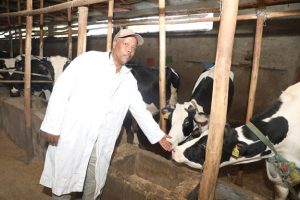
On the 13th of May 2022, the Intergovernmental Authority for Development (IGAD) during its high-level ministerial meeting in Nairobi, Kenya, discussed the ongoing drought in the IGAD region and reviewed the status and responses to the drought disaster in the region.
Accordingly, ministers responsible for Disaster Risk Management from the member countries and donor organizations joined the session and discussed the current drought situation of the region, immediate humanitarian needs, long-term resilience programming and gaps in funding across the region, according to the IGAD press statement.
According to IGAD the current drought that hit the IGAD region is badly affecting the lives and livelihoods of the people of the region, mainly the pastoralist communities. IGAD also recognizes the severity of the current drought impacts that it is widespread across the region. IGAD also underlines the increasing climate vulnerability of the Eastern Africa region with adverse effects of climate change.
The member states following the meeting acknowledged the severity of the drought situation and reached an agreement to look beyond immediate assistance and to rethink the region’s approach to resilience, in addition to accelerating short-term response to halt the impacts of the drought.
The member states underlined the adoption of Disaster Risk Reduction actions for sustainable development, to comprehensively address the disasters and climate risks effectively and sustainably, announced in their communiqué.
During the high-level meeting, IGAD announced that currently over 40.4 million people of the region are facing high levels of food insecurity, which shows a 30 percent increase from the beginning of April. During the beginning of April, the number of people facing food insecurity was 29 million, according to IGAD. But, the number of food-insecure people has dramatically increased due to the continued severe drought in the region.
In his opening remarks during the meeting, IGAD’s Executive Secretary, Workneh Gebeyehu (PhD) said that within weeks, the number of people in need of humanitarian assistance has risen sharply. “The most current estimates by experts across our member states show that across the IGAD region, approximately 40.4 million people are facing high levels of food insecurity. This is an increase of 30% from the 29 million that had been recorded at the beginning of April”, Workneh underlined.
According to current data of IGAD’, 10.6 million people in Sudan, 8.9 million people in South Sudan, 8.1 million people in Ethiopia, 7.7 million people in Somalia, 3.5 million people in Kenya and 1.6 million people in Uganda are food insecure due to the drought and other additional disasters and factors.
The Executive Secretary underlines that an immediate increase of emergency response is a timely task to address the drought situation in the region as it affects tens of millions of people, adding a total of 6.3 billion U.S. Dollars is needed to address the impacts of the current drought in the Horn of Africa region. IGAD’s climate wing, ICPAC reported that, an agreement was reached during the meeting on the extremely criticalness of the next six months to save lives and livelihoods affected by the drought through increasing emergency response by the member states and donor partners.
Director of IGAD’s Climate and Application Center (ICPAC), Guleid Artan (PhD) on his part explained that recovery from drought is tough task for pastoralist communities due to their nature
of economic base. Most pastoralists are dependent on livestock production and the livestock is highly affected by the severe drought which makes it difficult to easily replace the livestock resource of every household shortly.
“For pastoral communities, recovery after drought is always the most challenging aspect of the entire scenario, it takes an average of five year to build livestock back from one episode of drought,” Dr. Guleid argued adding the pastoralist communities that experienced the devastating impacts of the current drought in the Horn region needs urgent support and sustainable development programs.
For the Director no one anywhere in the world can prepare or become resilient for five years of drought impacts. Hence, it needs regional and global joint responses to support the people of the region to minimize the impacts of the drought on the region in general and the pastoralist community in particular.
IGAD Member states on their communiqué recognizes that pastoralists and semi-pastoral livelihoods in arid and semi-arid areas are highly vulnerable to drought and stressed on the need to scale-up mid to long-term investments such as strategic feed reserve, water reservoir, social protection and risk financing mechanisms, to build resilience of the region in general and the pastoralist communities in particular.
To reduce the impacts of drought and other disasters, IGAD calls all member states to strengthen national and sub-national multi-hazard early warning systems. In addition, IGAD calls for the development of early action mechanisms by budgeting and building technical capabilities to act in anticipation of drought disaster and to ensure timely and effective early responses in the region.
Similarly, the regional organization calls upon IGAD member states and Secretariat to institutionalize the Food Security and Nutrition Working Group (FSNWG) and the IGAD Centers of Excellence on Nutrition (ICEN) to enhance the provisions of up-to-date national and regional food security and nutrition situation analysis for improved food insecurity early warning and early action mechanisms. Through strengthening regional institutional mechanisms and joint actions by synergizing the available potentials of the region, IGAD argues on enhancing regional resilience for drought and other disasters.
On its communiqué released following the conclusion of the Friday meeting, the regional organization urges the necessity of undertaking a feasibility study to establish food, medical and feed reserves and other non-food supplies in strategic locations across the region to mitigate theregion against the impacts of the current drought and to facilitate access to food and feed reserves.
Developing regular regional and national food and feed balance sheets and comprehensive picture of the pattern of food supply in the region, are also among the recommendations of IGAD for its member states.
Meanwhile, IGAD announced the adoption of the “IGAD Disaster Risk Management Strategy” to build resilience to drought and other disasters in the region and to reduce the impacts on communities, their livelihoods and livelihood assets, ICPAC reported. Parallel to calling for emergency coordinated response for the current drought impacts in the region, IGAD focuses on building further actions to build regional resilience for drought and other disasters.
Hence, to build resilience of the region and each member state, IGAD focuses on strengthening institutional responses, regionally and nationally. In this regard, IGAD calls on the secretariat to develop the IGAD food and nutrition security situation assessment approach. Similarly, the communiqué encourages IGAD and member states to promote risk knowledge and drought hazard monitoring by developing drought risk profiles, atlases, and risk communication strategies to enhance community resilience and risk-informed development planning and investment.
IGAD strongly recommends the integration of climate change, disaster risk reduction and sustainable development strategies, policies, programmers’ and plans of action at all levels to ensure coherence in the implementation of disaster risk reduction and climate change adaptation actions in inclusive, resilient and sustainable ways in the IGAD region. It also promotes ensuring a whole-of-society approach to drought disaster risk reduction to build resilience of the communities of the region.
BY DARGIE KAHSAY
THE ETHIOPIAN HERALD TUESDAY 17 MAY 2022




